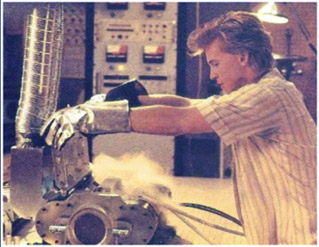
Riley Finn is a grad student who is secretly a government agent
Riley Finn (Buffy the Vampire Slayer)
Finn initially appeared as the TA for Psychology 101 at University of California, Sunnydale. It eventually became clear that he was pursuing a research line in experimental psychology, with special focus on the undead and supernatural. In addition to his teaching responsibilities, he also appeared to be earning additional income by collecting specimens for the laboratory. However, he is chiefly remembered for the relationship that he developed with one of his undergraduate students (Buffy Summers, major undeclared). While of dubious ethicality, it seems likely that the prospect of making it with hot undergraduates may attract others enthusiastic young men to pursue a research career.Unfortunately, Finn did not complete his studies. It seems likely that this is a direct consequence of the loss of his advisor, Professor Margaret Walsh. Walsh perished in a tragic experiment which went wrong when the sample she was working on stabbed her through the heart with a four foot iron spike. Lacking direction, Finn drifted for a while and then abandoned the freedom of academic research and instead took a military commission. This seems a common hazard: unable to cope without clear direction, research students often drop out and seek employment of a much more focussed and directed nature that does not require them to think creatively.
Sydney Bristow (Alias)
It was hard to judge exactly what Sydney Bristow was studying, since she spent so little time doing it. In her early appearances, we often saw her on campus, where she appeared to be pursuing masters' level courses. Soon she began to question her motivations: she stated that she wanted to complete her course in order to become a teacher, like her mother was. On learning that her mother is not dead, as she believed, but a secret former KGB agent, her motivation was somewhat diminished.The other reason for her low levels of commitment is Bristow's part time job, which she initially took up as an undergraduate. The example of the part-time student balancing career and study is a fine one, but like too many other part time students, when it comes to deciding whether to prioritise the long term goals of study or the immediate demands of a career in international espionage, Bristow puts assasination ahead of assignments. The need to travel frequently to exotic locations and kill people leaves her little time for her studies. The situation is exascerbated when she takes on a second part-time job, as a double agent for the CIA. Nevertheless, during early 2003, she took a day off to graduate, despite not appearing to have done any work for the last twelve months. Perhaps she managed to write up her thesis during her regular flights to far-away countries.

Sydney Bristow is a grad student who is secretly a secret agent

Fred is a grad student who is secretly a demon hunter
Winifred "Fred" Burkle (Angel)
When we first encounter Fred, it seems that she has made the mistake of many other young doctoral candidates: she has got distracted from pursuing her thesis, and she has fallen into other things. In her case, she has fallen into an interdimensional portal to the land of Plrtz Grb. Lack of local library or internet facilities, and being enslaved by the local populace, means that she lets her research fall by the wayside, and she makes no progress for several years. Eventually, some friends intervene, and bring her back to the real world with a bang (and a near apocalypse). Still she is unable to concentrate on work, and instead goes temporarily insane from the pressure to produce results.Fred then takes up a new career in pest extermination, but amazingly manages to maintain an interest in Physics in her spare time, and has a paper accepted to an international conference. It seems possible that she may complete after all, but old tensions re-erupt with her advisor, who attempts to reopen the portal and send her back to Plrtz Grb. This is averted when her boyfriend murders him, but with the supervisor-student relationship so irrevocably damaged, the chances of her submitting a thesis remain low.
Chris Knight (Real Genius)
We end on a more positive note. In the 1985 film Real Genius, Val Kilmer plays Chris Knight, depicted as a final year undergraduate, but more realistically he is living the life of a PhD student. In many respects, this is the most realistic portrayal of the research student life ever recorded on film, and not least because it is the only film to feature a research student in a lead role. Kilmer is exemplary: not only does he pursue cutting edge research, but he also finds time to mentor a young student, and to indulge in a rich and varied social life with a broad range of students, such as those from a nearby beauty college.As always, there is a downside. Knight's research is being funded by an industrial sponsor (the United States military), and the sponsor's interest in producing a high energy laser weapon for political assasination are at odds with his more high-minded academic aspirations. It does not help that he is frequently at odds with his advisor, who makes unreasonable demands in terms of his commitment to the laboratory and productivity. Rivalries with other research students who sabotage lab equipment also hamper his progress. Nevertheless, he manages to overcome all these obstacles to pass his exams and produce a proof-of-concept experiment in under 100 minutes with a pumping eighties soundtrack.

Chris Knight is a grad student who is secretly... Val Kilmer